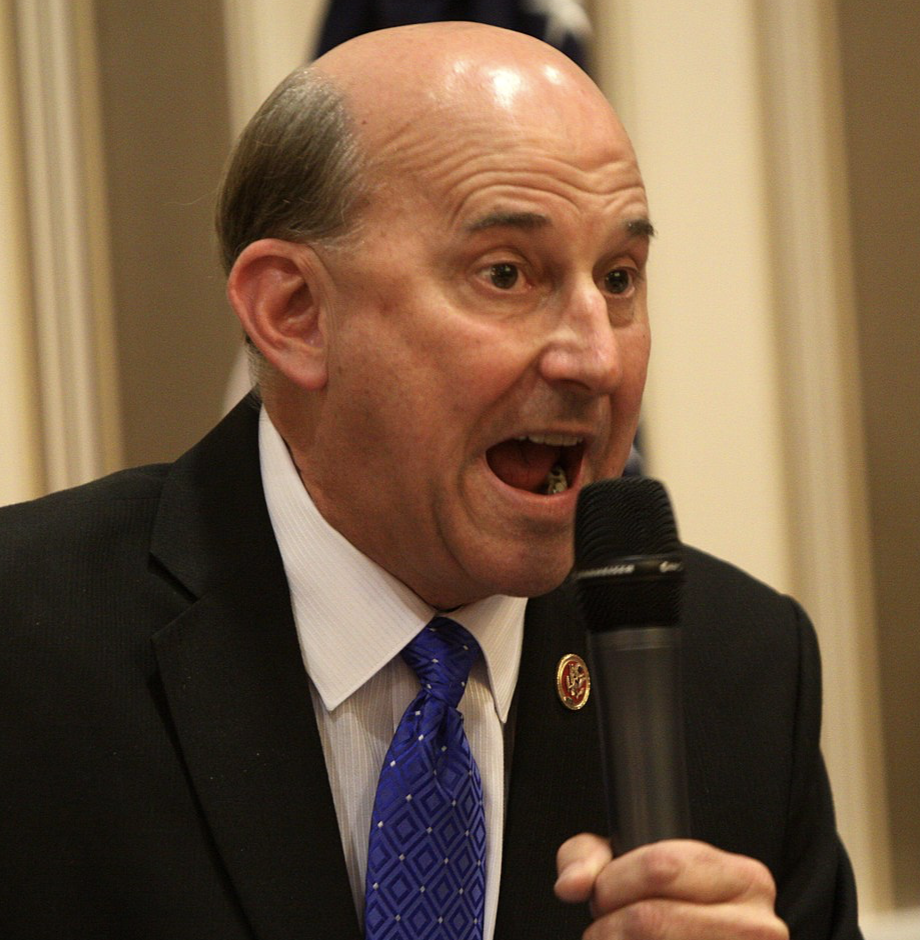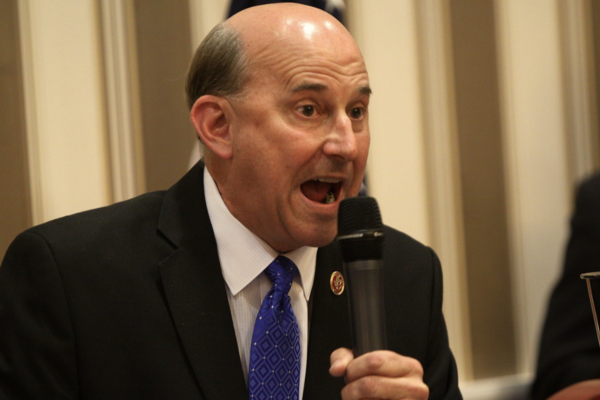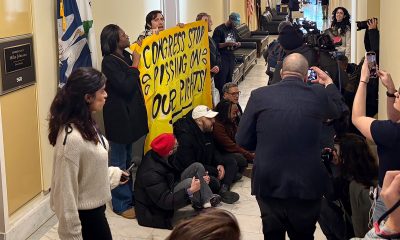News
Gohmert: Supreme Court ruling for trans people will create ’great dictators’
Texas lawmaker fear-mongers over First Amendment


Rep. Louie Gohmert (R-Texas) had dire predictions Saturday about the fate of the republic if the Supreme Court delivers a victory for transgender people in the pending Title VII cases.
Gohmert, a notorious and longtime opponent of LGBT rights, said the decision would lead to “such obscurity for right and wrong that it will chaos,” and transgender advocates seeking the ruling “think of out of chaos will come these great dictators.”
“Employers, the government…argue that the plaintiff’s reading of Title VII would so expand the concept of sex that employers would not know to comply and courts would not know how to enforce it,” Gohmert said.
Gohmert made the comments during a speech at the Values Voter Summit, an annual social conservative confab in D.C. hosted by the anti-LGBT Family Research Council. His wide-ranging remarks emphasized religiosity, reminisced about the greatness of American figures like George Washington and praised the Ten Commandants.
The Texas lawmaker made a special point to talk about a case the Supreme Court heard this week, EEOC v. Harris Funeral Homes. The litigations seeks restitution for Aimee Stephens, a transgender woman who was fired from her job at Harris Funeral Homes after she announced she’d transition.
The litigation, along with Zarda v. Altitude Express and Bostock v. Clayton County, will determine whether anti-LGBT discrimination is a form of sex discrimination, therefore prohibited under Title VII of the Civil Rights Act of 1964.
But the way Gohmert tells it, Stephens “ends up being let go” at Harris Funeral Homes “because he was violating their policies, and this is before the Supreme Court.” (Notably, Gohmert refused to refer to Stephens by the pronouns with which she identifies.)
Gohmert also praised U.S. Associate Justice Neil Gorsuch, noting the justice during arguments brought up a question on whether a ruling for transgender people will lead to “massive social upheaval.”
“Judge Gorsuch understood,” Gohmert said. “Judge Gorsuch said – asked this question: He says, ‘At the end of the day should he or she take into consideration the massive social upheaval that would be entailed in such a decision, in forcing people to recognizen someone for being them sex that they say they are at that moment?’ Anyway, he says, that is, in fact, more appropriate for a legislative than judicial function.”
While it’s true Gorsuch asked a question on potential “massive social upheaval,” the justice also suggested the pro-transgender side had the better statutory argument in the case. Several times, Gorsuch asked whether the concept of sex is in play in cases of anti-LGBT discrimination. That line of questioning lead to speculation he may rule for LGBT workers.
But Gohmert wasn’t done fear-mongering about a transgender win at the Supreme Court. If transgender workers are assured non-discrimination protections in the workplace, Gohmert said “that first part of the First Amendment will be gone.”
“You will not have the freedom to believe what Moses and Jesus said about sexuality,” Gohmert said. “That will be gone. You will be deemed a hater. You will be deemed to be mean-spirited when you have nothing but love for your fellow man but you know right and wrong, you’ve learned that.”
Further, Gohmert criticized the Matthew Shepard & James Byrd Jr. Hate Crimes Prevention Act, a law enacted in 2009 (which the lawmaker vigorously opposed at the time) to institute federal penalties for hate crimes against LGBT people.
Gohmert predicted if the law “is not changed — I said it back when it wasbeing brought up, if this passes — someday it’ll be used to prosecute Christian ministers for reading from the Bible.”
“And they thought I was talking about homosexuality,” Gohmert said. “I didn’t want to give them any ideas, but what I had in my mind back then was someday they’re going to come after Christians for saying Jesus said I’m the way the truth and the life. No one goes to the Father but by me. That’s hateful, that’s mean-spirited!”
Gohmert’s comments ignore the protections for religion and speech under the First Amendment, which were emphasized in an amendment included as part of the hate crimes legislation. At the time, advocates for the law said ministers won’t be punished for speech under the law unless they’re committing a violent act against an LGBT person as they speak.
Gillian Branstetter, a spokesperson for the National Center for Transgender Equality, said Gohmert’s concerns about “great dictators” are better focused on President Trump than transgender people.
“The rights of transgender people under Title VII are the result of two decades of federal court rulings, and 21 states have laws banning gender identity bias explicitly,” Branstetter said. “A decision in favor of trans workers in this case would do nothing more than affirm the same rights and opportunities to transgender people nationwide. Unless the Congressman knows something I don’t about our nation’s 2 million transgender people, the closest thing we have to a ‘great dictator’ in this country is our lawless president.”

The Comings & Goings column is about sharing the professional successes of our community. We want to recognize those landing new jobs, new clients for their business, joining boards of organizations and other achievements. Please share your successes with us at [email protected].
Congratulations to Gil Pontes III on his recent appointment to the Financial Advisory Board for the City of Wilton Manors, Fla. Upon being appointed he said, “I’m honored to join the Financial Advisory Board for the City of Wilton Manors at such an important moment for our community. In my role as Executive Director of the NextGen Chamber of Commerce, I spend much of my time focused on economic growth, fiscal sustainability, and the long-term competitiveness of emerging business leaders. I look forward to bringing that perspective to Wilton Manors — helping ensure responsible stewardship of public resources while supporting a vibrant, inclusive local economy.”
Pontes is a nonprofit executive with years of development, operations, budget, management, and strategic planning experience in 501(c)(3), 501(c)(4), and political organizations. Pontes is currently executive director of NextGen, Chamber of Commerce. NextGen Chamber’s mission is to “empower emerging business leaders by generating insights, encouraging engagement, and nurturing leadership development to shape the future economy.” Prior to that he served as managing director of The Nora Project, and director of development also at The Nora Project. He has held a number of other positions including Major Gifts Officer, Thundermist Health Center, and has worked in both real estate and banking including as Business Solutions Adviser, Ironwood Financial. For three years he was a Selectman, Town of Berkley, Mass. In that role, he managed HR and general governance for town government. There were 200+ staff and 6,500 constituents. He balanced a $20,000,000 budget annually, established an Economic Development Committee, and hired the first town administrator.
Pontes earned his bachelor’s degree in political science from the University of Massachusetts, Dartmouth.
Kansas
ACLU sues Kansas over law invalidating trans residents’ IDs
A new Kansas bill requires transgender residents to have their driver’s licenses reflect their sex assigned at birth, invalidating current licenses.

Transgender people across Kansas received letters in the mail on Wednesday demanding the immediate surrender of their driver’s licenses following passage of one of the harshest transgender bathroom bans in the nation. Now the American Civil Liberties Union is filing a lawsuit to block the ban and protect transgender residents from what advocates describe as “sweeping” and “punitive” consequences.
Independent journalist Erin Reed broke the story Wednesday after lawmakers approved House Substitute for Senate Bill 244. In her reporting, Reed included a photo of the letter sent to transgender Kansans, requiring them to obtain a driver’s license that reflects their sex assigned at birth rather than the gender with which they identify.
According to the reporting, transgender Kansans must surrender their driver’s licenses and that their current credentials — regardless of expiration date — will be considered invalid upon the law’s publication. The move effectively nullifies previously issued identification documents, creating immediate uncertainty for those impacted.
House Substitute for Senate Bill 244 also stipulates that any transgender person caught driving without a valid license could face a class B misdemeanor, punishable by up to six months in jail and a $1,000 fine. That potential penalty adds a criminal dimension to what began as an administrative action. It also compounds the legal risks for transgender Kansans, as the state already requires county jails to house inmates according to sex assigned at birth — a policy that advocates say can place transgender detainees at heightened risk.
Beyond identification issues, SB 244 not only bans transgender people from using restrooms that match their gender identity in government buildings — including libraries, courthouses, state parks, hospitals, and interstate rest stops — with the possibility for criminal penalties, but also allows for what critics have described as a “bathroom bounty hunter” provision. The measure permits anyone who encounters a transgender person in a restroom — including potentially in private businesses — to sue them for large sums of money, dramatically expanding the scope of enforcement beyond government authorities.
The lawsuit challenging SB 244 was filed today in the District Court of Douglas County on behalf of anonymous plaintiffs Daniel Doe and Matthew Moe by the American Civil Liberties Union, the ACLU of Kansas, and Ballard Spahr LLP. The complaint argues that SB 244 violates the Kansas Constitution’s protections for personal autonomy, privacy, equality under the law, due process, and freedom of speech.
Additionally, the American Civil Liberties Union filed a temporary restraining order on behalf of the anonymous plaintiffs, arguing that the order — followed by a temporary injunction — is necessary to prevent the “irreparable harm” that would result from SB 244.
State Rep. Abi Boatman, a Wichita Democrat and the only transgender member of the Kansas Legislature, told the Kansas City Star on Wednesday that “persecution is the point.”
“This legislation is a direct attack on the dignity and humanity of transgender Kansans,” said Monica Bennett, legal director of the ACLU of Kansas. “It undermines our state’s strong constitutional protections against government overreach and persecution.”
“SB 244 is a cruel and craven threat to public safety all in the name of fostering fear, division, and paranoia,” said Harper Seldin, senior staff attorney for the ACLU’s LGBTQ & HIV Rights Project. “The invalidation of state-issued IDs threatens to out transgender people against their will every time they apply for a job, rent an apartment, or interact with police. Taken as a whole, SB 244 is a transparent attempt to deny transgender people autonomy over their own identities and push them out of public life altogether.”
“SB 244 presents a state-sanctioned attack on transgender people aimed at silencing, dehumanizing, and alienating Kansans whose gender identity does not conform to the state legislature’s preferences,” said Heather St. Clair, a Ballard Spahr litigator working on the case. “Ballard Spahr is committed to standing with the ACLU and the plaintiffs in fighting on behalf of transgender Kansans for a remedy against the injustices presented by SB 244, and is dedicated to protecting the constitutional rights jeopardized by this new law.”
National
After layoffs at Advocate, parent company acquires ‘Them’ from Conde Nast
Top editorial staff let go last week

Former staff members at the Advocate and Out magazines revealed that parent company Equalpride laid off a number of employees late last week.
Those let go included Advocate editor-in-chief Alex Cooper, Pride.com editor-in-chief Rachel Shatto, brand partnerships manager Erin Manley, community editor Marie-Adélina de la Ferriére, and Out magazine staff writers Moises Mendez and Bernardo Sim, according to a report in Hollywood Reporter.
Cooper, who joined the company in 2021, posted to social media that, “Few people have had the privilege of leading this legendary LGBTQ+ news outlet, and I’m deeply honored to have been one of them. To my team: thank you for the last four years. You’ve been the best. For those also affected today, please let me know how I can support you.”
The Advocate’s PR firm when reached by the Blade said it no longer represents the company. Emails to the Advocate went unanswered.
Equalpride on Friday announced it acquired “Them,” a digital LGBTQ outlet founded in 2017 by Conde Nast.
“Equalpride exists to elevate, celebrate and protect LGBTQ+ storytelling at scale,” Equalpride CEO Mark Berryhill said according to Hollywood Reporter. “By combining the strengths of our brands with this respected digital platform, we’re creating a unified ecosystem that delivers even more impact for our audiences, advertisers, and community partners.”
It’s not clear if “Them” staff would take over editorial responsibilities for the Advocate and Out.



















